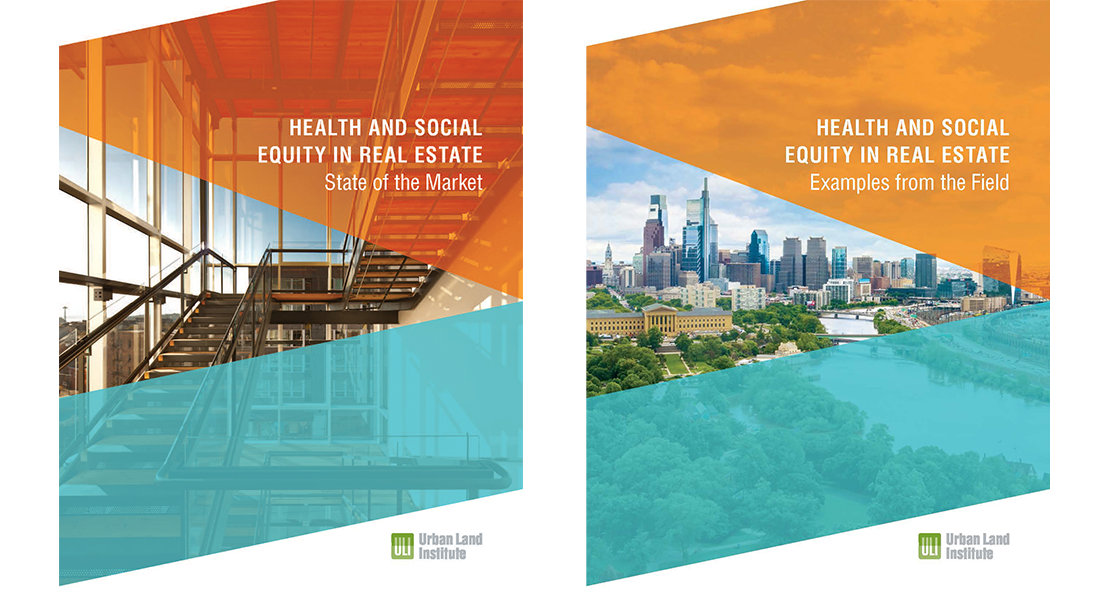
Awareness is growing among business leaders and investors across all industries of the importance of considering environmental, social, and governance (ESG) elements when making operational or investment decisions. In the past, the real estate industry has paid most attention to environmental issues. However, ULI recognized recent interest in health and social equity and took a deep dive into the role real estate plays in social value creation.
First, in two companion reports from the Americas region, ULI shares data and insights about trends, drivers, and leading approaches on health and social equity in the real estate industry. Second, in a report from the Europe, Middle East, and Africa (EMEA) region ULI guides the industry on incorporating social value into corporate strategy, business practices, and even investment theory.
According to the companion reports Health and Social Equity in Real Estate: State of the Market and Health and Social Equity in Real Estate: Examples from the Field, commercial real estate companies are beginning to grasp the value of health and social equity investments in their portfolios. The movement toward health is being propelled by a variety of factors, including evidence demonstrating a return on investment, increased demand from tenants and customers, public policies and incentives, and the rise of healthy building certification systems.

“Health has become a key area of focus for real estate practitioners, including developers and building owners, operators, and investors,” said W. Edward Walter, ULI global CEO. “Increasingly, real estate developers are looking beyond the building to promote healthy and more equitable communities and address racial injustice. These reports build on ULI’s work to help create healthy and socially equitable communities where all people can grow, thrive, and prosper.”
The 2020 coronavirus pandemic has further pushed health to the forefront for real estate companies. The pandemic, and the protests for racial justice that spread across the United States in summer 2020, have highlighted the vital role that the real estate industry can play in improving public health by mitigating the spread of disease, enhancing racial and social equity, and implementing practices that ensure that everyone has the opportunity to thrive.
Meanwhile, the report Zooming in on the “S” in ESG: A Road Map for Social Value in Real Estate asks the real estate industry to acknowledge its social responsibility and its role in leaving a lasting legacy. More importantly, it identifies key barriers to creating a shared understanding of and a common approach to describing and measuring social value. The report states that, for this to be achieved across the industry, the creation of social value must span the value chain and the life cycle of assets. Good intentions must not be lost in the transfer of projects between organizations, teams, or stages, and metrics might need to be switched to maintain continuity as projects move from planning to constuction and then to management.
Lastly, the EMEA report provides the foundation for a road map of what’s needed for the industry to contribute to more inclusive and sustainable development and a trusted future.
Lisette van Doorn, CEO of ULI Europe, comments: “As providers and stewards of the built environment, the real estate industry clearly has a clear role to play in creating social value. However, the financialization of real estate—where property is solely looked at through the lens of being a financial asset that can generate revenue and profit—has led to a disconnect between financial value creation and social value creation.
“COVID-19 is a wake-up call, and while the pandemic has brought major risks and challenges for the industry, it also opens up opportunities to rethink how to repurpose and connect real estate development and investment to local, place-based needs. We need to prioritize and consider the role of the real estate industry in helping tackle social and spatial inequalities. The key to enhancing social value creation is redefining value not just in financial terms, but also to account for social, economic, and environmental well-being outcomes over the long term.”
Now, the expectations of building users and communities are also changing. In coming years, a focus on health and social equity will no longer be just “nice to have” for real estate leaders—focusing on health and social equity will be essential.
Explore


